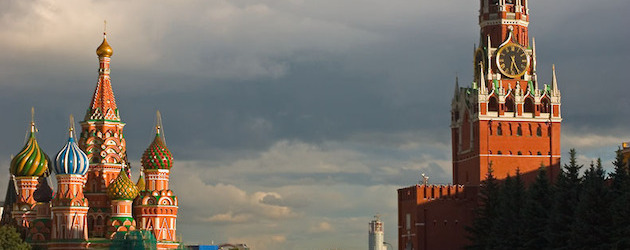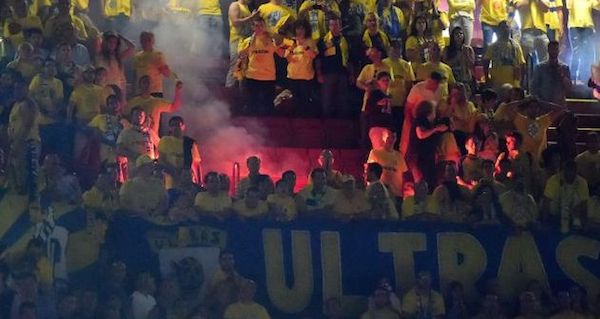by Rob Scott / @robscott33
CSKA Moscow didn’t just lose to Maccabi Tel Aviv last night in Milano. That would have been one thing - for a €38million roster to fall short against an opponent over whom they held numerous physical advantages would have been considered careless. No, CSKA threw the game away so catastrophically, inching further towards a gut-punch that is so familiar, one suspects it has become a learned behaviour.
Why has this club, with the ability to sign any player in Europe, to hire a decorated coach intimately familiar with the organisation and its history, become so bad at winning the big one? It’s a question on the lips of every basketball fan on the continent, just as it was last year, and the year before.
The last two CSKA teams at least looked highly impressive when it didn’t really matter - in the Regular Season and Top 16. This one could barely muster consistency even if it did just enough to stumble to victories it scarcely deserved. Yet thirty minutes into the semi final, it looked like none of that mattered. CSKA moved the ball almost flawlessly, even Sonny Weems, king of the ball-stoppers, finished with six assists. This was a different CSKA, one that even its detractors could admire.
Ettore Messina had found a recipe that worked. Before Milos Teodosic began unpicking Maccabi’s pick and roll defense, Aaron Jackson had showed what an effective defender he is, little did we know how important that could have been at the climax. Maccabi had to switch on ball screens with the less mobile Sofo and although it didn’t lead to Teodosic assists, the ball invariably found its way to a mismatch inside. When it swung out to perimeter, CSKA couldn’t knock down most of the open shots, which allowed Maccabi to hang around, even if it didn’t appear to be particularly ominous.
Results don’t condemn the process though, and when Vitaly Fridzon knocked down a three from the corner to make it 49-38 towards the end of the third quarter, Maccabi looked beaten. Eleven points appeared to loom large over a team whose halfcourt offense had been almost completely shut down. Only a trio of three pointers and an Alex Tyus tip-in registered in the field goal column since halftime, it looked too much.
Ricky Hickman’s triple cut a lead that had been 15 points down to 10 at the third buzzer. Still nobody believed, outside of the nine-thousand-or-so yellow-clad hordes shamefully hidden in darkness in the stands, and the players and coach in whom they never lost faith. Of course, Maccabi enjoyed a miraculous comeback in this arena in Game One of the playoffs, when they overcame a similar deficit in much less time. Then, as now, Tyrese Rice hanging in the air, falling away and somehow forcing the ball on to and through the hoop is indelible. Like Printezis, it should become an eponymous shot from now til he retires.
The most damaging moment of the game for CSKA may have been Jackson limping off with another injury with three minutes to go. Already playing through pain, he emerges with no shame from this game, or this season. Its debatable whether Messina would have benched Teodosic in crunch time, but Rice gave us another set of clips for the Serbians’ Defensive Juggernaught reel. Still, again, CSKA could have survived, if they had been able to inbound the ball and keep hold of it with 13 seconds remaining.
Viktor Khryapa didn’t deserve this. His long-armed, ranging defense and the bailout three he buried with a man in his face to put CSKA up by nine in the fourth quarter should have been what we remember from this game. It would be wrong to bury the whole narrative in his gut, and twist the knife. He didn’t fumble the ball because CSKA have a joyless, corporate identity. He didn’t fumble it because Maccabi yellow outnumbered CSKA red by nine or ten to one. He didn’t fumble it because of some mystical life-force that Maccabi and Olympiacos have that CSKA doesn’t. But the fact remains, the ball found him in a pressure situation, and he dropped it.
This wasn’t a random divot on the penalty spot, and it wasn’t a policeman leaning over the barrier to cause a mass pile-up. It was human error. Sport is played out not only to find a winner, but for the pleasure and intrigue of those who watch it. We search for explanations for events we witness but can’t control. Who knows what goes through the mind of players who probably don’t ever read the things that are written about them? If the key events in sport are just random, they lose all meaning. So we attempt to construct it.
It’s said that serial criminals fall into a deep sleep on their first night in jail, such is the subconscious relief of being caught. Now their captivity and surrender to the pressure of Being CSKA is complete, perhaps these players can only bloom in rehabilitation elsewhere? Teodosic and Krstic will almost certainly have no choice. One wonders what Khryapa, Fridzon and Jackson could do in a less suffocating environment.
Of course, the Final Four rewards the fortunate. In a five-game series, it is likely that CSKA’s latent skill, size and pedigree would prevail. But the narrative of failure under pressure is so satisfying because this club can pick from the continent’s entire talent pool, and it got it so spectacularly wrong. Like a super-rich young idiot, cruising through life on only his name, when they fail it invites ridicule, without sympathy.
Hundreds of millions of euros thrown at star names, with no Euroleague title to show for it, it still seems that CSKA has all the advantages that money can buy, but none of the ones it can’t.
 Posts
Posts

